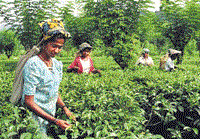|
Tea industry on contamination, subsidy and Iran fears The Colombo Tea Traders’ Association (CTTA)
said last week that a tea delegation to Japan was with the help
of scientific evidence able to convince buyers that Ceylon Tea was
not contaminated as feared.
Fertilizer subsidy The CTTA criticised the decision of the government
to provide a subsidy only to producers with less than five acres
saying, “Considering that the entire agriculture sector is
equally affected by this resolution, such discriminatory determinations
only serve to highlight the inequitable treatment being meted out
to the formal plantation sector.” Iran The CTTA said since September 2005, there has
been a concerted campaign conducted in the Iranian market to denigrate
Ceylon Tea. “Malicious and totally unfounded aspersions are
being cast on the product, creating amongst consumers a perception
of adulteration and unhygienic contamination. Tariff concessions from Russia Following intensive negotiations over a protracted
period, driven by the Commerce Department, Russia has offered tariff
liberalisation for Sri Lanka, as an element of its accession negotiations
with the World Trade Organisation.
Private tea manufacturers' plea for state assistance By Nimesha Herath The Private Tea Factory Owners' Association while applauding the return of fertilizer subsidies for tea smallholders said similar assistance should be provided for tea manufacturers to help them get over a current crisis. The association said with problems mounting in terms of modernization of factories, rising costs, lower tea prices, labour shortages, etc, government support is crucial for the industry to be sustained. "As our manufacturing costs continue to accelerate, we are constantly on the edge facing losses along the way. With no assistance from the government, if this situation follows many factories will be closed down in the future," Edward Welikala, one of the members of the Association, told reporters last week. He said negative publicity given in Iran, which
is a prime destination for low grown teas in Sri Lanka, has reduced
the demand for teas substantially affecting the overall tea prices
in the market. According to the association, the average tea auction
prices for low grown teas recorded for January to April 2006 came
down to Rs 199.31 from Rs 193.37 within the four months showing
a 2.3 percent reduction in prices. In other words low grown prices
have fallen by Rs 4.68 per kg. Dr. Sarath Samaraweera, another member
of the association said that low grown tea growers and factory owners
are struggling with labour shortages and high wages. "For the
last one and a half years, there has been a 25-30 percent increase
in labour wages. We have to provide transport, accommodation, food,
etc for these workers. This is a big burden as our revenue is low,"
he said.
He also said although tea-buying countries pressurise local companies to become 'socially responsible employers' and obtain HACCP certification they don't have the necessary capital to do so. A current Asian Development Bank loan given to upgrade factories is only available for regional plantation companies. The association said that as this facility is not directly available to tea manufacturers, they hoped the government will provide assistance in modernizing their factories.
UAL strong growth in first quarter but profits ease Union Assurance has posted an impressive 29% growth in turnover for the first quarter of the current year but consolidated after tax profits fell to Rs. 34 million against Rs. 37 million in the same period last year. In a statement it didn’t give reasons for the fall but said rising turnover levels was due to healthy increases in both general and life insurance gross written premium. General insurance premiums rose by 38% from Rs. 546 million in March 2005 to Rs. 754 million in March 2006. Life insurance premiums also increased by 14% from Rs. 329 million in March 2005 to Rs. 375 million in March 2006. “Premiums from retail and corporate segments of the market recorded satisfactory growth,” noted Chairman Ajit Gunewardene, adding that “The results reflect UAL’s strategy to expand distribution capabilities in both general and life insurance businesses.” UAL said it offers one of the highest no claim bonus schemes with substantial savings of up to 70% of the premium.
Dialog Telekom shows hefty profits Dialog Telekom recorded an after-tax profit of Rs 2.31 billion in the latest quarter, representing a 34 percent earnings growth compared to Rs 1.72 billion recorded for the corresponding quarter in 2005. These numbers were fuelled by parallel growth in the key revenue drivers of subscriber base, network reach, increase in usage per customer and expansion in international business. Domestic revenues, which consist mainly of pre-paid and post-paid revenue, accounted for approximately 71 percent of the company's revenue in the first quarter of 2006. Meanwhile the company’s revenue increased by 51 percent to Rs 5.83 billion compared to the first quarter of 2005. When compared with results pertaining to the first quarter of 2005, pre-paid contribution has increased from 33 percent to 37 percent with a growth in subscriber base from 1.18 million to over 1.84 million, while the direct costs for the period amounted to Rs 2.07 billion compared to Rs 1.32 billion in the previous year, which is a 56 percent increase. Significant components of direct cost are Telecom
equipment depreciation, Network cost, International Origination
cost, Outbound roaming cost, Lease circuit rental costs and International
Telecommunication Levy. |
|||||||||||||
Copyright © 2006 Wijeya Newspapers
Ltd. All rights reserved. |

